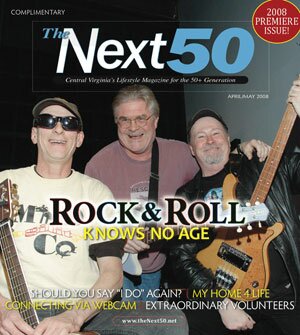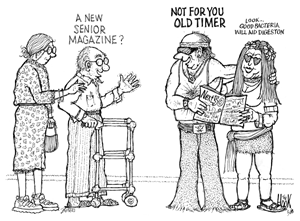NEWS- Not 'seniors': New magazine for lively boomers


Publisher Eric Lund started a second magazine that captures his lifestyle.
PHOTO BY WILL WALKER

The man who brought Charlottesville a glossy shelter magazine last year has targeted another market: aging baby boomers– although publisher Eric Lund avoids such words as "aging" or "senior" in The Next50, "Central Virginia's Lifestyle Magazine for the 50+ Generation."
"All of those words are a real turn-off for this group," he says.
Lund (who's 53) prefers "active lifestyle magazine," and the debut issue features long-time local rockers Greg Allen, Charlie Pastorfield, and Steve Pollock on the cover with the observation, "Rock & Roll knows no age."
As with his first magazine, Charlottesville House and Home and Garden, Lund believes he's found a niche that was not being served: upscale Baby Boomers who are retiring early and moving here.
"I didn't want to do a seniors magazine," he says. "Those tend to be depressing." And he thinks Boomers– folks born between 1946 and 1964– will be a viable readership for the next 20 years.
"We want someone under 50 to pick it up," he adds.
His target audience is under 65, the adult children of seniors who are influential decision makers in their parents' assisted living. (The magazine carries a number of ads for such facilities.) And like Lund himself, his readers also may be responsible for young children. "I have an eight- and a 10-year-old," he says.
The free bimonthly offers local content. "I didn't want people to view it as boring filler, with how-to-set-up-a-portfolio articles," he says. Hence articles on local rockers (not the chairs) and where to buy the best natural food in town.
The first print run was 15,000, and Lund says he's gotten emails from readers who say they read it cover to cover.
His first publication, House and Home, has been out a year now. "We're feeling a little bit of a pinch," he says, which he attributes more to the smack-down in real estate than to competition from the Daily Progress, which launched a look-alike shelter magazine called Homestyle last year as well.
"The response has been good," says Lund of his publications. "We're holding our own." He concedes that part of the motivation to launch The Next50 was "to make the business platform work."
Does he worry that the Progress will now launch a boomer magazine? He acknowledges that "They did it with the home magazine," referring to Homestyle, the daily's insert that emerged after Lund launched House and Home.
The Progress already has a nostalgia mag called Reflections that Lund blasts as "drab" and says "looks kind of depressing."
In contrast, he says, "[The Next50] is intended to be a celebration of the second half of life, that it's better." He sees other publications that target older readers as "more about holding on instead of getting better."
Lund is not the first to target the 50-plus crowd with a local publication. The late '90s saw the launch of More! Monthly, a tabloid that Fluvanna Review publisher Eric Allen bought, kept for a year or two, then killed around 2002.
More! "never caught on with readers," Allen concedes. "It's hard to localize when people are getting information from AARP and the Internet."
More! had a circulation of 10,000, and Allen says when he did a survey, only five readers responded. "I usually get a few hundred," he says. That was the day he decided to cease publication: "I got tired of working for nothing."
Allen is "very impressed" with The Next50's first issue. "It looked much better on glossy paper than ours ever did. It has good content– Charlie Pastorfield. Everybody knows who he is. I think it will be more successful than we ever were."
At a time when the publishing industry is reeling and advertising dollars are shrinking, Allen sees no reason The Next50 shouldn't survive.
"Definitely he has a chance," Allen says of Lund. "Look at In the Kitchen– who'd think that would still be around? Or Echo, these strange niche publications you have in Charlottesville. Who picks these up? [Lund] is going after the right market, the upscale one that Charlottesville prides itself on.
"We were trying to go higher than [Jefferson Area Board for Aging]'s Silver Linings market," says Allen. "JABA caters more to the lower income. That was our mistake."
Silver Linings breathed its last breath two years ago. "It was published by the Daily Progress," JABA CEO Gordon Walker says. "They kept the ad revenue, and we did the content. We felt the community was ready for a more upscale publication."
Walker wanted to attract readers beyond JABA's membership and link to the boomer population, so he planted the seed with Lund about going glossy.
"The Daily Progress was among the many we talked to," says Walker. "Eric stepped forward." JABA guarantees some advertising in The Next50 and advice on content.
Feedback about TheNext50 has been "energetic and robust," says Walker, and he's confident the publication is targeting the right market, if for no other reason than this: "There are 78 million boomers."
#